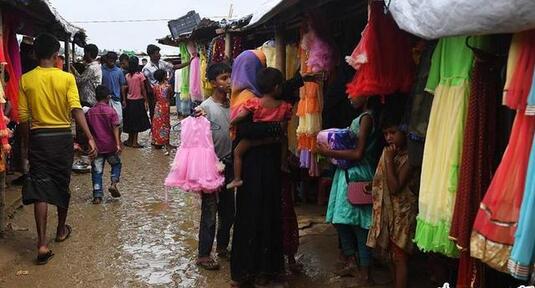(单词翻译:单击)
听力文本
Rohingya Refugees Celebrate Holiday, Remember Home
Hundreds of thousands of Rohingya refugees in Bangladesh celebrated the Muslim holiday of Eid al-Adha on Wednesday. The refugees prayed for better lives and wondered if they will ever go back to their homes in Myanmar.
The calls to prayer came early in the large refugee camps. People lined up in temporary structures used as mosques. Children with newly washed clothes watched from a window.
The four-day holiday of Eid al-Adha celebrates the Prophet Ibrahim and his willingness to sacrifice his son. Muslims often kill sheep, cattle or goats on the holiday. Some of the meat is distributed to the poor. But the refugees in this camp are the poor and few gave such gifts.
The Muslim Rohingyas have faced generations of discrimination in largely Buddhist Myanmar. They are denied citizenship rights, attacked and sometimes not able to practice their religion.
"We could not pray during Eid in my village for years, we had to pray secretly," said refugee Nurul Alam. "I have freedom here, but I don't want it here."
"We don't belong here," he continued. "It's good that nobody is coming to kill us, but I want to go back where my parents' graves are located."
More than 700,000 Rohingyas entered Bangladesh last year. They are fleeing a campaign of destruction by the Myanmar military and Buddhist mobs. The campaign followed attacks by a Rohingya rebel group.
Thousands of people are believed to have been killed in the attacks by the Myanmar military. Rights activists believe it was the government's attempt to drive the Rohyngya from the country.
Many in Buddhist-majority Myanmar see the Muslim Rohingyas as illegal migrants from Bangladesh. They call them "Bengalis." Most have long lived in poverty in Myanmar's Rakhine state, next to Bangladesh.
The events of the past year have made for a sad Eid al-Adha.
"We are happy, but again we are not happy, said 60-year-old Shamsul Alam as he walked to a mosque for prayers. "I had my land...Here I don't have any problem for food, but I don't have what I need."
"I am nobody here," he said.
I'm Susan Shand.
重点解析
1.citizenship rights 公民权利
Citizenship rights for all Aborigines were recognised following a referendum on the issue in 1967.
1967年的全民公投,确认了土著人的公民权利。
2.go back 返回
The feud with the Catholics goes back to the 11th century
与天主教的夙怨可以追溯到11世纪。
3.refugee camps 难民营
They say they will stay to rebuild their homes rather than retreat to refugee camps.
他们说他们将留下重建家园而不是躲到难民营里。
4.be able to 能够
They may be able to help with childcare so that you can have a break
他们可以帮忙照料孩子,这样你就可以歇一歇了。
5.Hundreds of thousands of Rohingya refugees in Bangladesh celebrated the Muslim holiday of Eid al-Adha on Wednesday.
Hundreds of thousands of 成千上万的
Office material worth hundreds of thousands of pounds was smashed up.
价值数十万英镑的办公用品都被砸烂了。
Hundreds of thousands of people took to the streets to mark the occasion.
数十万人走上街头庆祝这一时刻。
6.People lined up in temporary structures used as mosques.
lined up 排队
The football fans lined up for the tickets.
足球迷们排队买票。
When he came back the sergeant had lined up the terrorists.
他回来时,中士已经让恐怖分子列队站好了。
参考译文
罗兴亚难民庆祝穆斯林宰牲节
周三,成千上万的罗兴亚难民在孟加拉国庆祝穆斯林宰牲节。难民们祈祷过上更好的生活,他们也想知道能是否回归缅甸的家园。
一大早,大型难民营里中就传出祈祷声。人们在临时搭建的清真寺里排队祷告。孩子们身穿新洗的衣服从窗口向外。
为期四天的宰牲节是为了缅怀先知易卜拉欣和纪念其愿意主动牺牲爱子。穆斯林经常在节日里宰杀牛、羊。有些肉分给穷人。不过,难民营里的难民都是穷人,很少有人送这样的礼物。
在大多数人都信奉佛教的缅甸,穆斯林罗兴亚人几代人都受到歧视。他们的公民权利被剥夺,频受攻击,有时甚至无法从事自己的宗教活动。

难民努鲁尔·阿拉姆说,“多年来,在我们村里,宰牲节期间我们不能公开祈祷,所以只能偷偷祈祷”。“在这里虽然宗教自由,但我不想在这里。”
他继续说,“我们不属于这里。虽然没有人会来杀我们,但我还是想回到祖宗长眠的故乡。”
去年,70多万罗辛亚族人进入孟加拉国。他们为了逃离缅甸军队和佛教暴徒的破坏运动。此前,一个罗兴亚叛军组织发动了袭击。
据信,数千人在缅甸军方的袭击中丧生。人权活动人士认为,这是缅甸政府试图驱赶罗辛亚人。
在佛教徒占多数的缅甸,许多人认为穆斯林罗辛亚族人是来自孟加拉国的非法移民。他们称其为“孟加拉人。”在靠近孟加拉国的缅甸若开邦,多数人长期生活在贫困之中。
去年发生的事件使“宰牲节”笼罩了一层悲伤的气氛。
60岁的沙姆斯·阿拉姆前往清真寺祈祷时表示:“我们很开心,却又开心不起来。”“我有故土……在这里虽然衣食无忧,但却没有拥有我真正需要的东西。”
“在这里我什么也不是,”他说。
苏珊·尚德为您播报。
译文为可可英语翻译,未经授权请勿转载!


